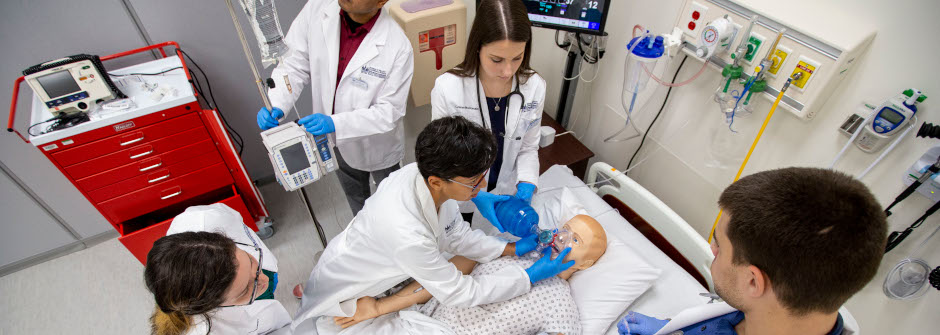
Curriculum
The comprehensive curriculum for the Seton Hall Master of Science in Physician Assistant Master of Science in Physician Assistant program is designed to provide extensive clinical experience while promoting competence in research and a solid foundation in basic sciences and physical examination skills.
The three-year, 96-credit Master of Science in Physician Assistant curriculum is team-taught by practicing physician assistants, physicians and instructors with doctoral training in a variety of areas. A blend of traditional lectures, online coursework and problem-based learning is used throughout the year to ensure that new knowledge can be practically applied.
Clinical Education
Early exposure to patients is a cornerstone of the Seton Hall Master of Science in Physician Assistant program. Students enter the clinical environment in the first semester of the program to practice history-taking and physical examination skills. The second and third years of the program are characterized by extensive exposure to patients. Students complete a minimum of 52 weeks of core and elective rotations in a variety of settings, studying for 4 to 8 weeks in each of the following clinical rotations, in addition to elective opportunities:
- Surgery
- Internal Medicine
- Pediatrics
- Obstetrics/Gynecology
- Emergency Medicine
- Psychiatry
- Outpatient Medicine
- Family Practice
This extensive clinical experience prepares our graduates to be confident, flexible and able to make an immediate impact in the clinical setting.
See our Frequently Asked Questions for more information about the Seton Hall Master of Science in Physician Assistant curriculum and matriculation.
Course Listing
The following is a list of the courses and clinical experiences that our PA students will pursue in each semester of the three-year program. There may be slight variation in the credit load for some semesters due to the timing of clinical rotations.
Requirements may change. For a full description of any of the courses and program requirements, see the Graduate Catalogue.
First Professional Year
Fall Semester
- Human Anatomy (4 credits)
- Human Physiology (3 credits)
- Psychiatry (2 credits)
- Introduction to Clinical Medicine I (4 credits)
- Professional Seminar I (2 credits)
- Pharmacology I (2 credits)
Spring Semester
- Neuroscience (3 credits)
- Pathophysiology (3 credits)
- Pharmacology II (2 credits)
- Laboratory Diagnostics (2 credits)
- Electrocardiography (1 credit)
- Introduction to Clinical Medicine II (4 credits)
Second Professional Year
Summer Semester
- Diagnostic Imaging (2 credits)
- Professional Seminar 2 (2 credits)
Fall Semester
- Introduction to Clinical Medicine III (4 credits)
- Fundamentals of Clinical Medicine (8 credits)
- Biostatistics (2 credits)
- Professional Seminar 3 (2 credits)
Spring Semester
- Professional Seminar 4 (2 credits)
- Research Methods I (2 credits)
- Standardized Clinical Experiences/SCPEs (10 credits)
Summer Semester
- One to three months of Standardized Clinical Experiences/SCPEs (2-6 credits)
Third Professional Year
Fall Semester
- Principles of Epidemiology (2 credits)
- Biomedical Ethics (2 credits)
- Research Methods II (2 credits)
- Professional Seminar 5 (2 credits)
- Standardized Clinical Experiences/SCPEs (8 credits)
Spring Semester
- Research Methods III (2 credits)
- Professional Seminar 6 (2 credits)
- Healthcare Policy (2 credits)
- Standardized Clinical Experiences/SCPEs (8 credits)
